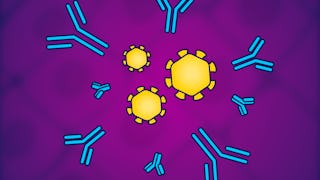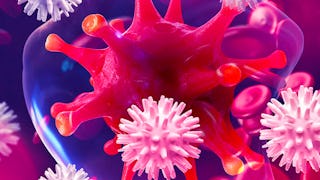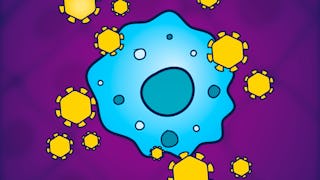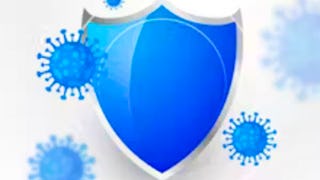Our immune system relies on an innate and an adaptive arm that communicate and collaborate to provide us with an optimal response against pathogens. This course focuses on our innate immunity which provides us our first, fast and inherited defence against infections.


Immunology: Innate Immune System
This course is part of Immunology: The Immune System and its Failures Specialization


Instructors: Sophie Rutschmann
9,879 already enrolled
Included with
(150 reviews)
Recommended experience
What you'll learn
You will identify key innate immunity cells, molecules, and direct defence mechanisms.
You will also learn how our microbiota, the overall micro-organisms found in our body, influences our innate immune response.
Finally, you will understand how our innate immune cells inform our adaptive system of the presence of a threat.
Skills you'll gain
Details to know

Add to your LinkedIn profile
9 assignments
See how employees at top companies are mastering in-demand skills

Build your subject-matter expertise
- Learn new concepts from industry experts
- Gain a foundational understanding of a subject or tool
- Develop job-relevant skills with hands-on projects
- Earn a shareable career certificate

There are 5 modules in this course
In module one, we will explore the main component of the innate immune system. We will start by looking at the surfaces that are first exposed to potential pathogens and how they prevent most pathogens from entering our body. We will then learn about our main innate protective mechanisms and discuss how this inherited system is able to recognise and combat infection. By the end of this module, learners will be able to describe these actors and mechanisms in detail.
What's included
4 videos5 readings2 assignments
In module two, we will explore a key soluble component of our innate immune system: the complement. We will learn about its main components, how it gets activated by pathogens and how the outcome leads to pathogens destruction. We will also explore how the complement system contributes to other innate immune activities, such as phagocytosis, that is the uptake of microorganisms by immune cell for destruction.
What's included
1 video3 readings1 assignment
In module three, we will investigate how our microbiota plays a protective role in our health. We will first define the human microbiome in more details and explore its influence on various common pathologies such as asthma, diabetes or cancer. The module ends on an opportunity for learners to reflect and share with others on the effects of pro-biotics on our health.
What's included
3 videos2 readings2 assignments1 discussion prompt
In module four, we will understand how the innate system communicates with the adaptive immune cells. We will explore which cells oversee this essential function and how they capture, digest and present pathogenic molecules to the adaptive immune cells to for their activation. Importantly, we will also investigate how the innate immune response helps this second phase of response to ‘adapt’ to the nature of the infection.
What's included
3 videos1 reading2 assignments
In module five, we will look at one example of innate cells, called Natural Killers, that are directly able to destroy infected and tumour cells. We will explore how they interact with other immune cells, how they recognise their target cells and the mechanisms they use to lead to their death. Importantly, we will also discover the mechanisms that prevent their mis-activation to prevent the disastrous destruction of health host cells.
What's included
1 video3 readings2 assignments1 discussion prompt
Earn a career certificate
Add this credential to your LinkedIn profile, resume, or CV. Share it on social media and in your performance review.
Instructors


Offered by
Explore more from Basic Science
 Status: Free Trial
Status: Free TrialImperial College London
 Status: Free Trial
Status: Free Trial Status: Free Trial
Status: Free TrialImperial College London
 Status: Preview
Status: PreviewJordan University of Science and Technology
Why people choose Coursera for their career




Learner reviews
150 reviews
- 5 stars
86.66%
- 4 stars
8%
- 3 stars
3.33%
- 2 stars
2%
- 1 star
0%
Showing 3 of 150
Reviewed on Mar 24, 2023
This course was amazing and provides the basic fundamental knowledge of how our first line of immunity defends us from from invaders.
Reviewed on Feb 16, 2024
The best way of teaching helped me to understand the Immunology Subject very well!! Thanks to all the teachers for this wonderful course. Looking forward for more such interesting courses.
Reviewed on Aug 11, 2023
Overall Good. But video has a problem. Audio has echo that cause headache

Open new doors with Coursera Plus
Unlimited access to 10,000+ world-class courses, hands-on projects, and job-ready certificate programs - all included in your subscription
Advance your career with an online degree
Earn a degree from world-class universities - 100% online
Join over 3,400 global companies that choose Coursera for Business
Upskill your employees to excel in the digital economy
Frequently asked questions
To access the course materials, assignments and to earn a Certificate, you will need to purchase the Certificate experience when you enroll in a course. You can try a Free Trial instead, or apply for Financial Aid. The course may offer 'Full Course, No Certificate' instead. This option lets you see all course materials, submit required assessments, and get a final grade. This also means that you will not be able to purchase a Certificate experience.
When you enroll in the course, you get access to all of the courses in the Specialization, and you earn a certificate when you complete the work. Your electronic Certificate will be added to your Accomplishments page - from there, you can print your Certificate or add it to your LinkedIn profile.
Yes. In select learning programs, you can apply for financial aid or a scholarship if you can’t afford the enrollment fee. If fin aid or scholarship is available for your learning program selection, you’ll find a link to apply on the description page.
More questions
Financial aid available,

